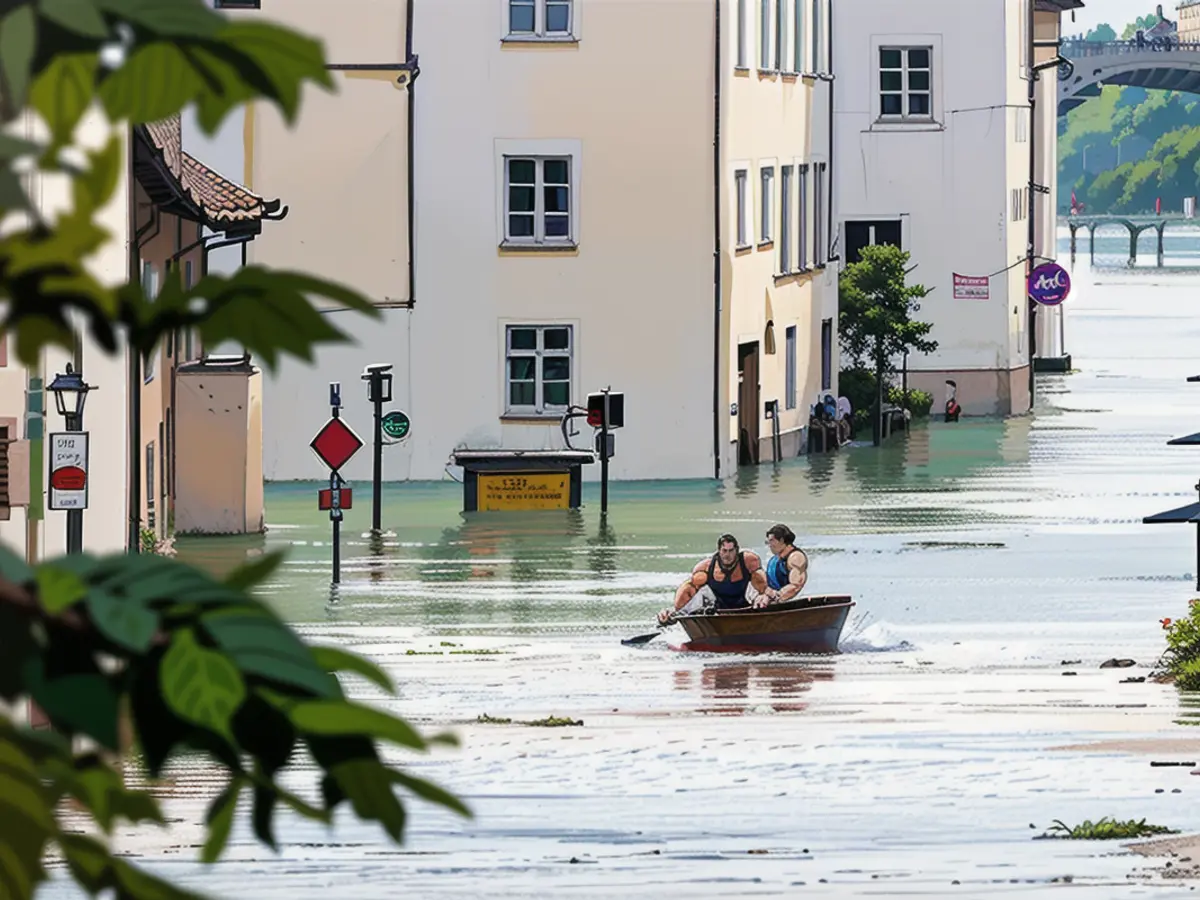Weather expert declares green light for southern Germany.
The rain has now stopped, but meteorologists caution a warning for the south as water levels are still high at the Danube. The water masses have swept away cars, houses, fields, and streets, among other things, and ruined rooms and furniture with mud. Southern Germany is hit hard, especially areas along the Danube in Bavaria. Multiple districts and cities, including Passau and Regensburg, have declared a disaster situation to better coordinate rescue efforts.
One tragic death has occurred in the Allgäu after a woman's car drifted into the water. This marks the fifth known victim. Several areas along the Danube have hit their peak water levels, with some expecting more intense flooding. However, the flood warning service reassures that the water levels will not surpass previous ones. "We can now issue a warning for southern Germany," explained DWD meteorologist Robert Hausen. While rain is not expected at the moment, occasional showers and thunderstorms may occur in the flood areas, but they won't be as severe as before. This is the case for the entire country until Thursday.
Unprecedented rain has fallen in southern Germany, amounting to century-flood levels. 20 to 30 measuring stations have recorded such high levels of rain, mainly in the region northeast of Augsburg to almost the Bodensee. Some of the severe damages are attributed to one-day rainfall, while others come from three-day rainfall.
In Passau, the water level is expected to reach a staggering ten meters in the afternoon, while in the same timespan, the peak of the Inn will also reach the city. The city spokesperson mentioned that water levels in Passau could exceed seven meters due to the recent heavy rain on Monday.
Passau often faces flooding issues due to its location where the Danube, Inn, and Ilz rivers converge. The city has already closed several streets and landmarks. As such, authorities are keeping an eye on six missing people, including a firefighter in Swabia whose boat capsized while rescuing inhabitants from their flooded homes. The others managed to save themselves.
Regensburg evacuated close to 200 people from their homes on Monday night, and parts of Falkenstein Castle collapsed in Upper Bavaria thanks to the unrelenting rain. Similarly, many schools in Baden-Württemberg had to cancel presence teaching. Baden-Württemberg has started cleanup operations with preparations for relief measures. "We still have a long way to go before returning to normality," said a spokesperson for one affected community, Ebersbach an der Fils.
Flood travelers must prepare for possible restrictions and train cancellations as the potential for further disruptions persist in Bavaria and Baden-Württemberg. "We urge against traveling to the flood-stricken areas in Bavaria and Baden-Württemberg and suggest postponing unnecessary trips," Deutsche Bahn stated.
President Frank-Walter Steinmeier esteems the efforts of the thousands of rescuers risking their lives to save people and invites them to share their experiences and memories. Recognizing the detrimental effects of global warming, he expressed his belief that the current events will spark a conversation on the importance of climate protection. "The people in the flooded areas need our support first and foremost. The conversation about climate protection can follow," he told the Augsburger Allgemeine.
Federal Economics Minister Robert Habeck has promised support to those impacted by the floods in southern Germany. "For now, the top priority is to save lives. Those affected need support in the reconstruction process," he shared. Meanwhile, various organizations are calling for increased investment in flood protection measures. "Rising flood incidents are linked to climate change," noted Habeck. "I hope that this tragedy will lead to a more serious discussion about climate protection."
Read also:
The ongoing flood situation in southern Germany has been labeled as a natural disaster of international significance. The United Nations has expressed concern and offered assistance, recognizing the impact on Germany's infrastructure and people.
Germany's meteorological service is working closely with international partners to monitor the extreme weather conditions. They are sharing data and forecasts to aid in the prediction and prevention of further natural disasters.
In response to the floods, several international organizations have pledged aid and support to Germany. These include providing assistance in relief efforts and investing in long-term flood mitigation strategies.






